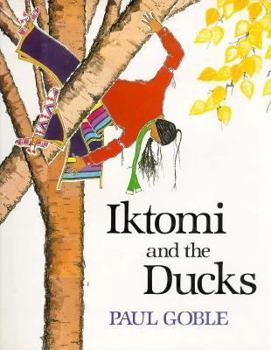Book Overview
After outwitting some ducks, Iktomi, the Indian trickster, is outwitted by Coyote. This description may be from another edition of this product.
Format:Hardcover
Language:English
ISBN:0531058832
ISBN13:9780531058831
Release Date:January 1990
Publisher:Orchard Books (NY)
Length:32 Pages
Weight:1.05 lbs.
Dimensions:0.3" x 9.1" x 11.0"
Age Range:4 to 8 years
Grade Range:Preschool to Grade 3
Customer Reviews
2 ratings
Joys of Parenting...
Published by Thriftbooks.com User , 16 years ago
... and sorrows, too, as your child gets too 'mature' to sit on your lap and let you read the Iktomi stories to him or her. My son and I have just been sorting through his childhood books (he's a junior in high school), planning to give most of them away. When we came to the dozen or so Paul Goble books, particularly the Iktomi stories, we both exclaimed that "No! these couldn't go to Goodwill." For one thing, they are all beautifully produced - durable, well-printed, etc. - good enough to save for another generation. But mainly the memories we share of laughing at the folly of the boastful trickster Iktomi are too precious to let go. Goble's many books for children retell legends and histories of the Native Americans of the Great Plains with wry wit and respect, and without a trace of ethnographic condescension. His art as a story-teller, however, is secondary to his art as an illustrator. There is a subtle quality of "Indian design" to his pictorial style, but he surpasses any other children's book illustrator I've ever seen in craftsmanship. Every page would catch your eye even on the museum wall next to the most acclaimed modern artists. I mean it! Paul Goble is a thrilling painter! A picture is worth a thousand words? Perhaps, but a thousand words aren't always worth a picture, so you'll have to see for yourselves. Even if you don't have a child yet or any more, treat yourself to an Iktomi book and read it to your cat or your begonia. You'll be enthralled.
This time Iktomi has his stomach set on roasted duck
Published by Thriftbooks.com User , 20 years ago
In this misadventure Iktomi the trickster of Plains Indian folklore is luring innocent ducks off the pond with this tricks in anticipation of a fine meal of roast duck. But if there is anything that the readers of Paul Goble's tales of Iktomi know by now, it is that things never go the way he plans. In previous tales Iktomi has been bested by a boulder and berries, and the pattern continues in "Iktomi and the Ducks: A Plains Indian Story." In his forward to the book Goble explains how these stories about the trickster are examples of what the Lakota called "ohunkaka," which are amusing stories that are not meant to be believed and which have moral lessons for those who hear them being told. Iktomi is walking along one day trying to find his horse so he can ride it in a parade, but then he notices some ducks enjoying themselves on a pond. Iktomi comes up with a strange way of catching some ducks for his dinner, and the really surprising thing is that his track actually works! But then Iktomi is distracted by two trees scraping up against each other and things are back to normal, which menas Iktomi's plans go wrong once again, especially once a Coyote also decides that roasted duck would taste pretty good. As always, Goble's colorful artwork captures both the essence of the tale and the tradition of art by the Plains Indians. This tale was originally told to Goble by Edgar Red Cloud, the great-grandson of the famous Chief Red Cloud who won the Powder River War of 1866-68, who first introduced the young artist to the tales of Iktomi. What makes "Iktomi and the Ducks" particularly interesting to Goble is that while this story is told in many tales of Native American people from across the continent, there are two seemingly unrelated elements that almost always appear: the killing the ducks while they dance with their eyes closed and the trees rubbing together. Goble can only speculate as to why these ancient elements have survived in all the retellings of this tell across the centuries. Young readers will no doubt take this bit of information as a minor speed bump in enjoying the story today, but it is interesting to think about what significance they might have had for the ancient peoples of this land.





